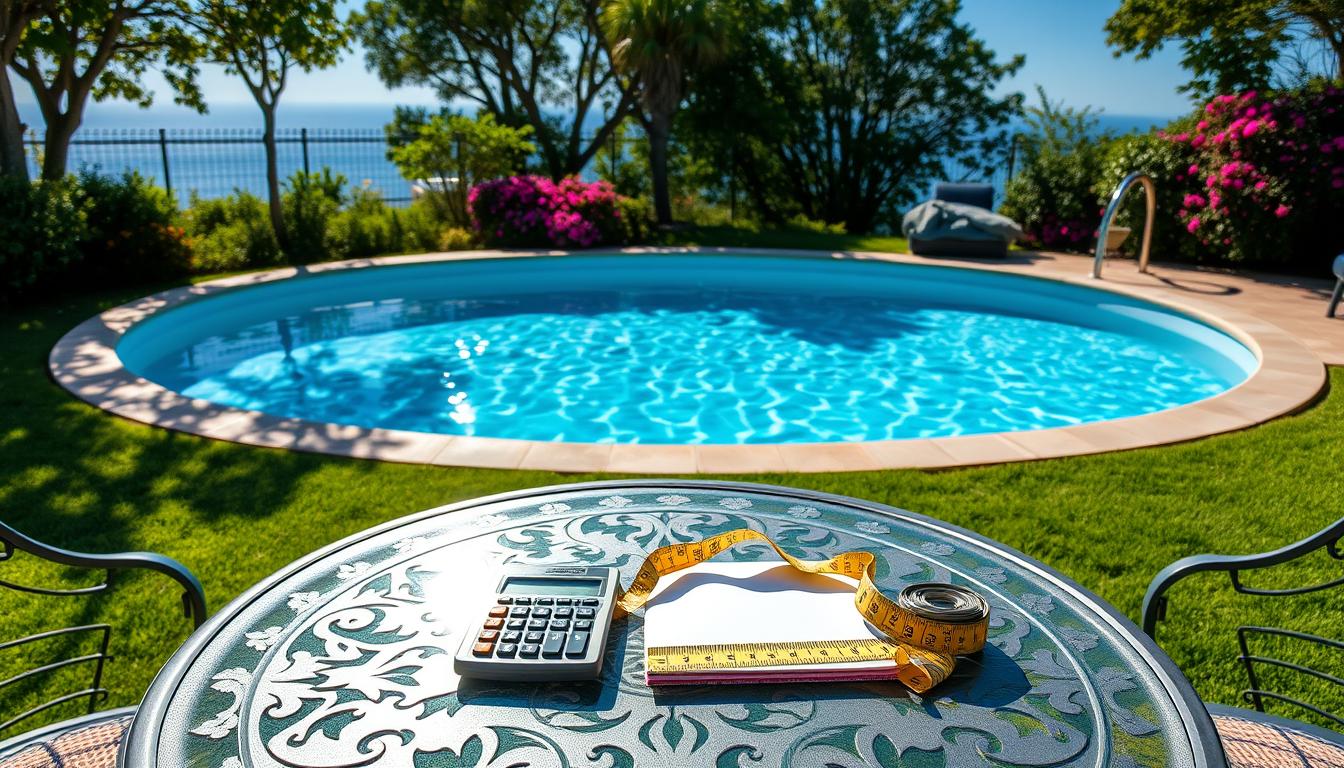
Knowing your pool’s volume is vital for safe and enjoyable swimming. It helps with chemical treatments, heating efficiency, and filtration cycles. A 22 x 52 pool is common for inground installations.
Accurate volume calculation is key to effective pool maintenance. This information ensures proper upkeep and a safe environment for swimmers.
Pool dimensions are crucial in determining overall volume. Length, width, and depth all contribute to total capacity. Accurate measurements provide a clear understanding of your pool’s size and gallon capacity.
This knowledge is essential for making informed decisions about pool maintenance. It helps keep your pool a safe and enjoyable space for everyone.
Key Takeaways
- Knowing your pool volume is essential for proper maintenance, chemical treatments, heating efficiency, and filtration cycles.
- A 22 x 52 pool is a common size for inground pools.
- Pool dimensions, including length, width, and depth, significantly impact the total pool capacity.
- Accurate pool volume calculations are crucial for ensuring a safe and enjoyable swimming experience.
- Understanding your pool size helps you make informed decisions about pool upkeep and maintenance.
Understanding Your 22 x 52 Pool Dimensions
A 22 x 52 pool is a rectangular inground pool. It measures 22 feet wide and 52 feet long. These dimensions offer a spacious swimming area for your family.
Length and Width Measurements
Your pool’s length and width are key for calculating its volume. The 22-foot width and 52-foot length determine the surface area. This information is vital for understanding the pool’s capacity and water needs.
Depth Variations
The pool’s depth is crucial for calculating water volume. Inground pools often have varying depths. They range from 3 feet to 8 feet or more.
Common depth variations for a 22 x 52 pool are:
- Shallow end: 3 to 4 feet
- Mid-section: 5 to 6 feet
- Deep end: 7 to 8 feet
Knowing these depth variations helps calculate water volume accurately. It also ensures safe swimming conditions for all users.
Rectangular vs Oval Shapes
A 22 x 52 pool is typically rectangular. However, the pool’s shape can affect volume calculations. Rectangular pools are easiest to measure due to consistent dimensions.
Oval-shaped pools with the same measurements have different volume calculations. Their curved ends result in a smaller surface area.
| Pool Shape | Length | Width | Average Depth | Volume (Gallons) |
|---|---|---|---|---|
| Rectangular | 52 feet | 22 feet | 5 feet | 34,100 |
| Oval | 52 feet | 22 feet | 5 feet | 31,900 |
The oval pool has a lower volume than the rectangular one. This difference is due to the curved ends reducing surface area.
Understanding your pool’s dimensions, depth, and shape is crucial. It helps you calculate water volume accurately. This ensures the right amount of water for safe and fun swimming.
Calculating Water Volume for Your 22 x 52 Pool
Accurate water volume is key for your 22 x 52 pool’s chemical balance and filling costs. Let’s explore how to calculate volume for rectangular and oval pools.
The shape of your pool determines which formula to use. We’ll cover both types to ensure you get the right calculation.
Formula for Rectangular Pools
For rectangular pools, use this simple rectangular pool formula: length times width times average depth. Here’s the equation for a 22 x 52 pool:
Volume (cubic feet) = 52 feet (length) × 22 feet (width) × Average Depth (feet)
To find average depth, add shallow and deep end depths, then divide by two. For example, with 4-foot shallow and 8-foot deep ends, the average is 6 feet.
Formula for Oval Pools
Oval-shaped 22 x 52 pools require a different oval pool formula. First, calculate the average depth as before. Then use this equation:
Volume (cubic feet) = 0.5 × 52 feet (length) × 22 feet (width) × Average Depth (feet) × 5.9
The 5.9 constant accounts for curved sides, which reduce volume compared to rectangular pools. This adjustment ensures accurate calculations for oval pools.
Converting Cubic Feet to Gallons
After finding the volume in cubic feet, convert to gallons for water capacity. Multiply cubic feet by 7.48 for the cubic feet to gallons conversion.
One cubic foot of water equals about 7.48 gallons. This conversion helps you understand your pool’s true water capacity.
| Pool Shape | Formula | Example Calculation | Water Capacity (Gallons) |
|---|---|---|---|
| Rectangular | Length × Width × Average Depth | 52 ft × 22 ft × 6 ft = 6,864 cu ft | 51,343 |
| Oval | 0.5 × Length × Width × Average Depth × 5.9 | 0.5 × 52 ft × 22 ft × 6 ft × 5.9 = 20,254 cu ft | 151,500 |
These formulas help you estimate your 22 x 52 pool’s water volume accurately. Use this info to manage pool maintenance and filling costs effectively.
How Many Gallons in a 22 x 52 Pool?
The water capacity of a 22 x 52 pool depends on its depth. A typical pool this size holds about 51,700 gallons, assuming a 6-foot depth. However, actual capacity varies based on specific depths.
Gallon Estimates for Common Pool Depths
Pool volume changes with different depths. A 22 x 52 pool with a 4-foot shallow end and 8-foot deep end holds about 48,400 gallons. Accurate depth measurements are crucial for determining precise water capacity.
Factors Affecting Water Volume
Steps, benches, and other features can reduce a pool’s water volume. The pool’s shape, whether rectangular or oval, also impacts capacity. Consider these factors when estimating gallons needed to fill your pool.
Understanding your pool’s water capacity helps with filling, maintenance, and treatment. This knowledge ensures your pool remains safe and enjoyable for everyone. Accurate calculations lead to better pool management and care.







